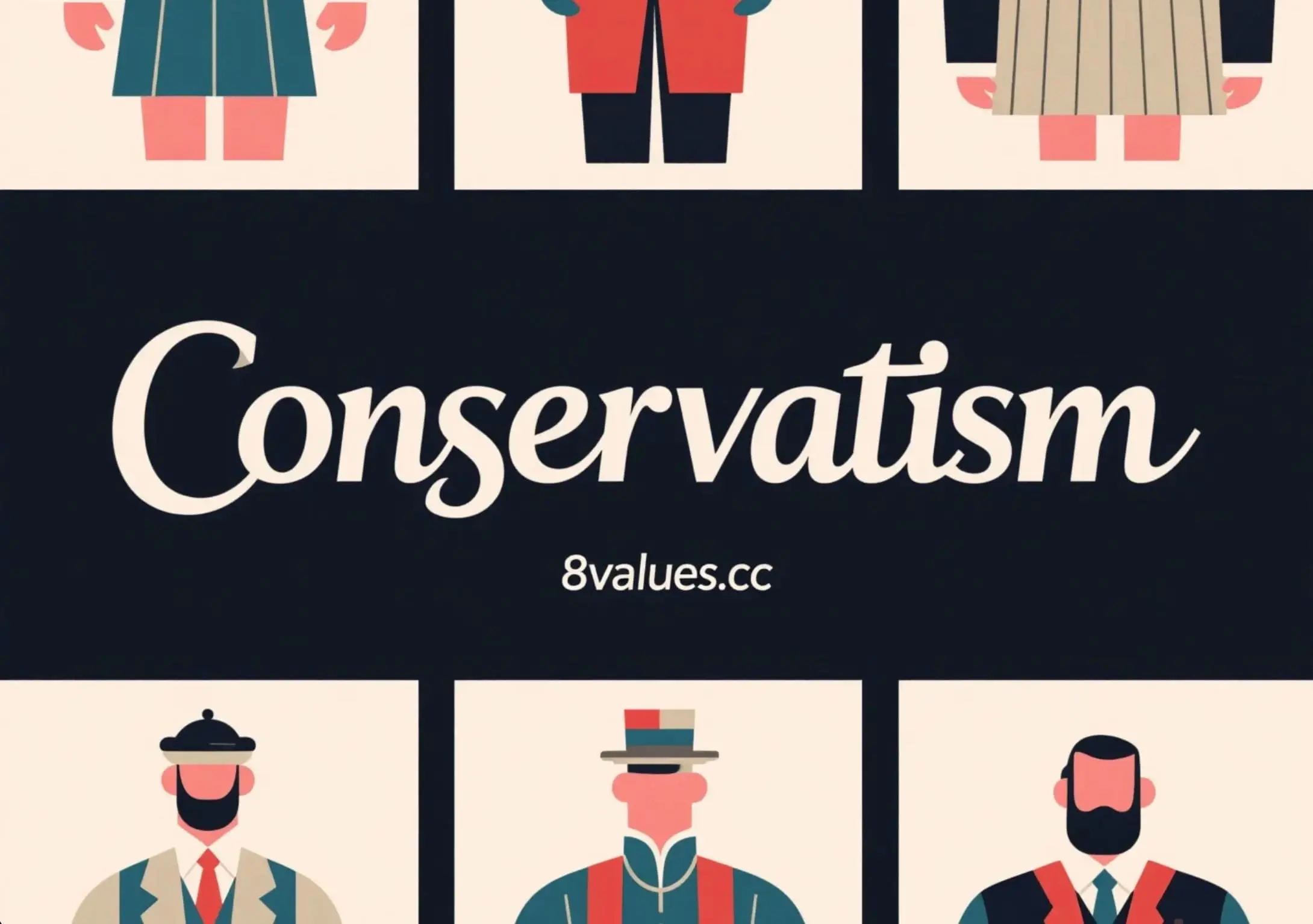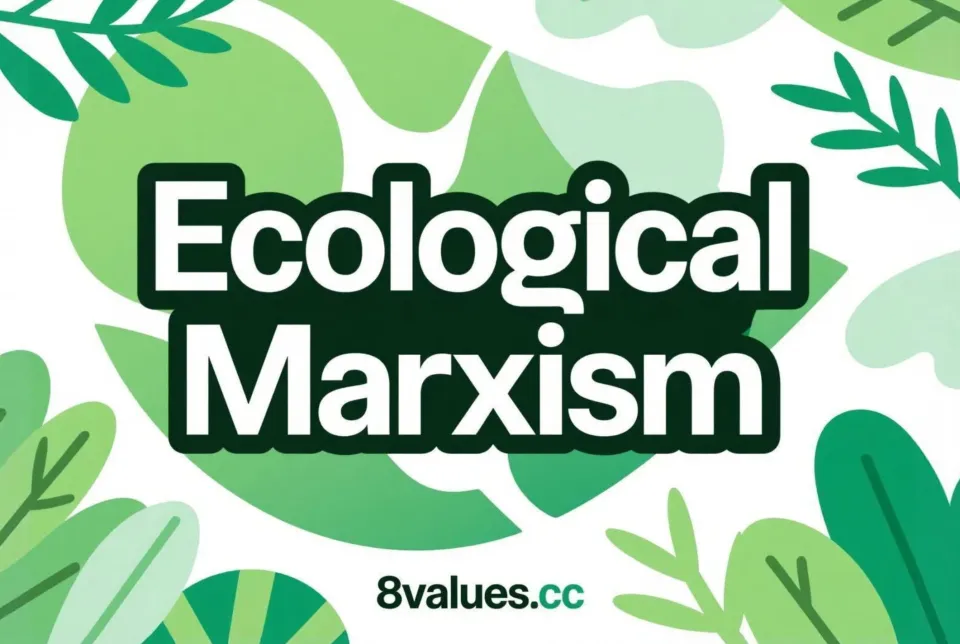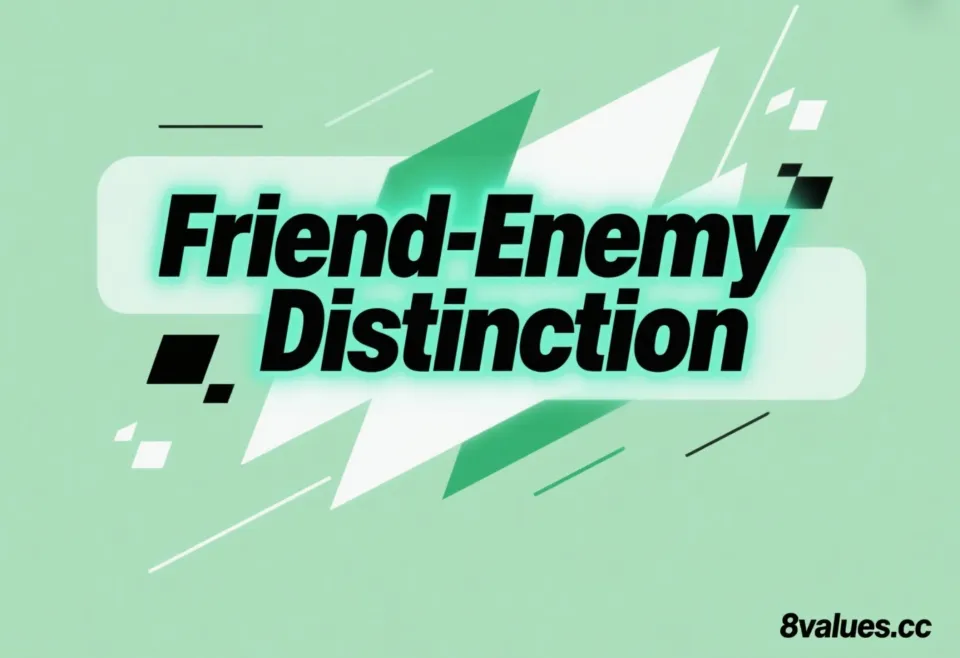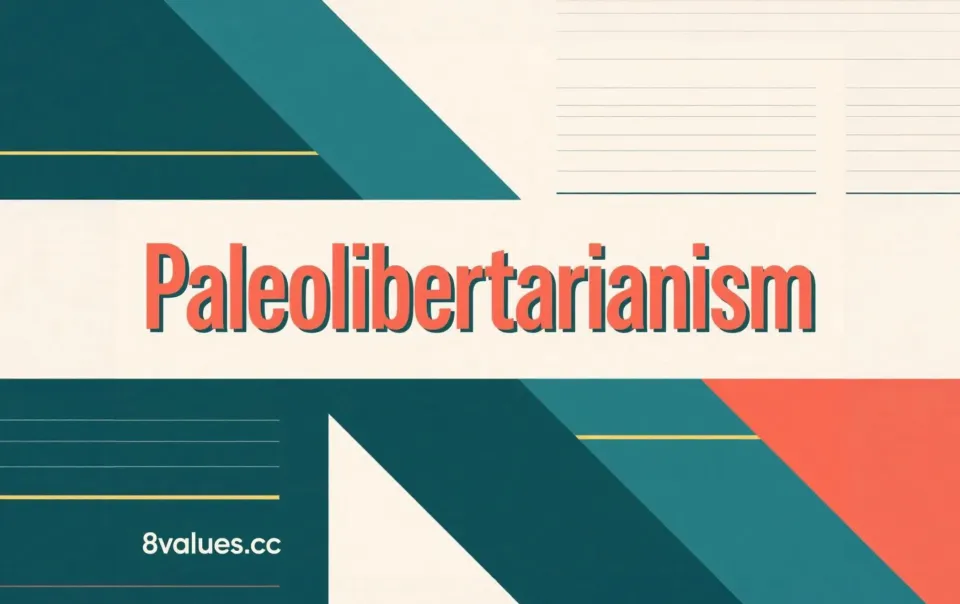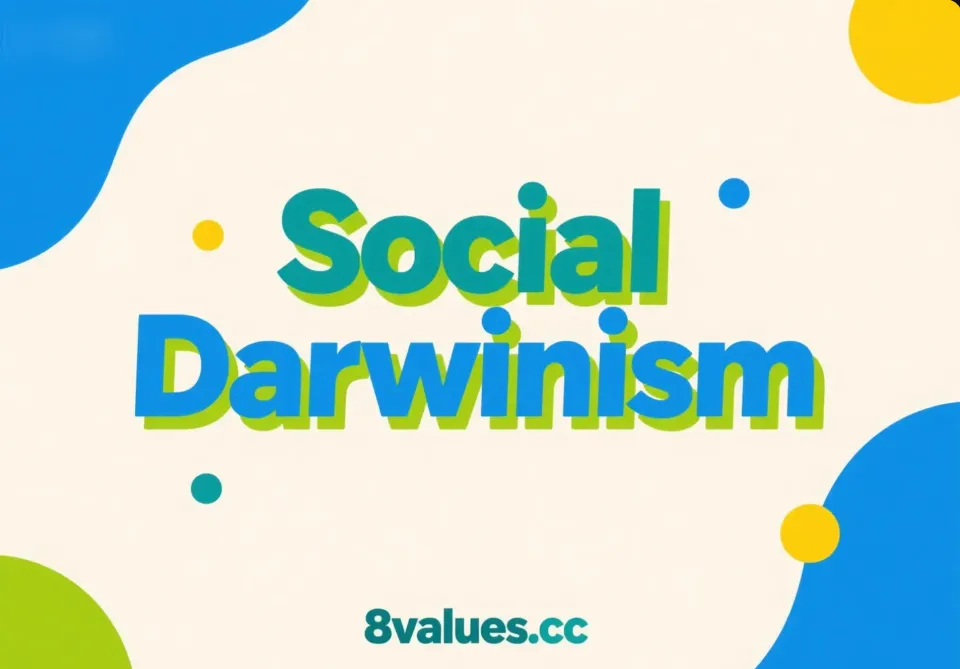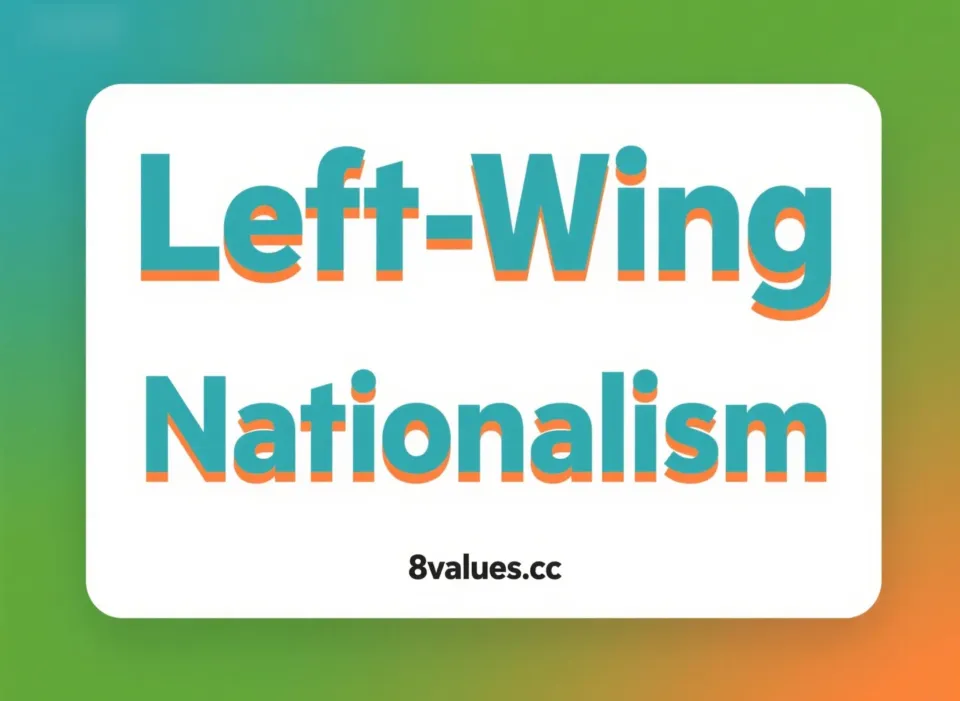Conservadurismo | 8 Valoras Interpretación de la ideología ideológica de las pruebas políticas
Explora profundamente la compleja ideología del conservadurismo, desde su apreciación de la tradición, su tendencia al cambio progresivo, hasta sus diversas manifestaciones en diferentes espectros culturales y políticos. Este artículo combinará la perspectiva del cuestionario de 8 valores para revelar los principios centrales del conservadurismo, la evolución histórica, la fundación psicológica y las escuelas y las características de todo el mundo, lo que lo ayudará a comprender su propio posicionamiento con mayor precisión en las pruebas políticas y comprender profundamente este sistema de valores que tiene un profundo impacto en el orden social.
El conservadurismo es una palabra extremadamente rica y variada en los pensamientos políticos y la ideología actual. No solo tiene una afirmación diversa entre las versiones, los académicos también tienen diferencias significativas en su uso como término analítico. Algunos lo ven como un conjunto específico de afirmaciones políticas, mientras que otros lo ven como una actitud política que ocurre en cualquier sociedad, en cualquier momento, cuando el sistema existente se ve amenazado. Sin embargo, al resumir las características comunes de varias ideas conservadoras, aún podemos tener una comprensión sistemática de ellas. Si desea conocer su posición específica en el espectro político , pruebe la prueba política del sitio web de cuestionario de 8Values , que puede ayudarlo a comprender sus tendencias ideológicas con más claridad.
La esencia y los principios centrales del conservadurismo: una cuidadosa consideración de la tradición, el orden y la naturaleza humana
El conservadurismo, como una tendencia de tratar de mantener y preservar las tradiciones sociales , los sistemas y los valores existentes , se refleja en muchos campos, como la cultura, la sociedad y la política. Su Core Creed varía según la región y el contexto. Sin embargo, bajo estas diversidad, algunos principios básicos comunes forman la piedra angular del pensamiento conservador. Michael Oakeshott, un filósofo conservador moderno británico, señaló que los conservadores prefieren familiares en lugar de extraños, conocidos en lugar de desconocidos, fait consumi, status quo en lugar de mitos, estado actual en lugar de posibilidades, limitado en lugar de límites, al alcance en lugar de distante, suficiente, suficiente en lugar de excedente, justo en lugar de perfecto, vida actual en lugar de utopía distante.
Russell Kirk elabora sobre los diez principios centrales del conservadurismo en su pensamiento conservador, muchos de los cuales giran en torno a la creencia en el orden moral , la tradición , la prudencia y la diversidad :
- Cree en el orden trascendente y las leyes morales : los conservadores creen que tanto el hombre como el estado están gobernados por las leyes morales, que se originan en la justicia divina que trasciende la sabiduría humana. La reverencia de Dios es el comienzo de la sabiduría.
- Respeto por la tradición y la experiencia : Edmund Burke, ampliamente considerado como el fundador del conservadurismo moderno , aboga por que la tradición es la cristalización de la sabiduría humana y ha experimentado la prueba de generaciones. En comparación con las cosas puramente abstractas (como la "racionalidad" de los pensadores de la Ilustración), la tradición puede usarse como base para establecer la propia vida. Los conservadores creen en la continuidad de la historia y el valor de las instituciones existentes .
- Prudencia : Esta es la virtud principal de un político, y cualquier medida pública debe medirse por su impacto a largo plazo en lugar de intereses o popularidad a corto plazo. Los conservadores enfatizan el cambio progresivo y organizado en lugar de revoluciones repentinas. Creen que las formas sociales y los sistemas políticos que cambian arbitrariamente en busca de una cierta ideología pueden conducir a desastres impredecibles.
- Reconociendo la imperfección de la naturaleza humana : los conservadores son pesimistas sobre el intento de los seres humanos de transformar el mundo a través de la razón y el sueño utópico resultante. Creen que los males sociales solo se pueden ralentizar y son difíciles de erradicar.
- Mantener el orden social y la jerarquía : los conservadores aceptan que la desigualdad social y económica se forma naturalmente y cree que es necesario un cierto grado de orden jerárquico para mantener el orden social. Creen que el liderazgo de la sociedad debe pertenecer a hombres sabios con excelente calidad, no líderes de masas.
- Apreciar los derechos de propiedad : la propiedad y la libertad son inseparables y son la base del desarrollo de la independencia individual y la civilización. El deber del gobierno es proteger en lugar de distribuir propiedades. Burke cree que los derechos de propiedad son la garantía del concepto inicial de la sociedad civil, y sus derechos son los más importantes, supremos e inviolables.
- Enfatice la diversidad y las diferencias individuales : altamente civilizado se caracteriza por la diversidad, la consistencia y la igualdad absoluta matarán la vitalidad y la libertad. La sociedad necesita diferentes clases, condiciones materiales y diversas desigualdad.
- Tendencia comunista : existe una tendencia de comunista en muchas ideas conservadoras, creyendo que las personas están formadas por las comunidades a las que pertenecen, y estas comunidades son formas de construir la sociedad que han resistido la prueba del tiempo.
- Pequeño gobierno e intervención limitada : los conservadores occidentales típicos están de acuerdo con un pequeño gobierno y se oponen a una regulación e intervención excesiva del gobierno en el mercado. Creen que los gobiernos excesivos limitan las libertades individuales y debilitan el sentido de responsabilidad de la sociedad civil.
La motivación psicológica y las características cognitivas del conservadurismo: el manejo de la incertidumbre
La investigación psicológica tiene discusiones en profundidad sobre la base cognitiva social motivacional del conservadurismo político y descubre que el conservadurismo se asocia significativamente con una variedad de variables psicológicas. Estas variables se derivan principalmente de la necesidad de incertidumbre y amenazas de gestión individual.
- Resistir el cambio y aceptar la desigualdad : estos son dos aspectos centrales de la ideología conservadora. La incertidumbre de la gestión se logra resistiendo el cambio, porque el cambio esencialmente interrumpe la realidad existente y trae inseguridad cognitiva. El reconocimiento de la desigualdad puede estar relacionado con el miedo, ya que genera y racionaliza la competencia y el dominio en las jerarquías sociales.
- Rigidez psicológica y pensamiento cerrado : el conservadurismo está relacionado con un mayor dogmatismo e intolerancia a la ambigüedad . Esto significa que los conservadores tienden a atenerse a cosas familiares, sacar conclusiones demasiado temprano y usar estereotipos simples. Están menos abiertos a nuevas experiencias. Por ejemplo, la necesidad de cierre cognitivo, el deseo de obtener rápidamente una cierta creencia, se correlaciona positivamente con una posición conservadora.
- Miedo a las amenazas y pérdidas : la ansiedad por la muerte , la inestabilidad del sistema y el miedo a las amenazas y las pérdidas se asocian significativamente con el conservadurismo político. Los conservadores pueden ser más sensibles a la información amenazante y preferir prevenir en lugar de promover los objetivos.
- Baja autoestima versus defensiva : a pesar de la correlación más débil, hay evidencia de que la menor autoestima puede estar relacionada con el conservadurismo y que los altos autoristas mostrarán una defensiva más fuerte cuando sea amenazado por uno mismo.
- Orientación de dominación social (SDO) : SDO mide el apoyo del individuo a la jerarquía social y la medida en que se espera que sus intraesos sean superiores a los de los grupos externos. Los puntajes SDO altos están altamente correlacionados con puntos de vista conservadores, oposición a la promoción de la igualdad a través de la ingeniería social y un mayor nivel de sesgo .
Juntos, estos factores psicológicos forman un marco complejo para comprender el conservadurismo político .
Volver histórico: el origen y el desarrollo del conservadurismo
El conservadurismo , como una clara filosofía política, se formó generalmente datada de finales del siglo XVIII.
- El nacimiento de la Revolución Francesa : las "Reflexiones de Edmund Burke sobre la Revolución Francesa" (1790) generalmente se considera el trabajo pionero del conservadurismo moderno . Burke condenó fuertemente el control y el exceso de la revolución francesa, creyendo que su enfoque radical para reemplazar completamente el sistema político original a través de la teoría abstracta conduciría a consecuencias catastróficas. Hizo hincapié en la importancia de las tradiciones históricas y las reformas graduales en lugar de los cambios radicales basados en la razón pura.
- El nacimiento del término : se cree que el término "conservadurismo" es utilizado por primera vez en 1818 por el pensador romántico francés François-René de Chateaubriand, cuando nombró su revista Le Conservateur.
- Europa del siglo XIX : el conservadurismo comenzó a ser ampliamente utilizado como una idea o ideología política a mediados del siglo XIX. Está asociado con los partidos conservadores en Europa en ese momento (como los conservadores en el Reino Unido, el Partido Conservador de los Prusianos) que tenían como objetivo defender el orden político aristocrático tradicional, resistir la ola de la democracia y el surgimiento de la clase trabajadora. Después del final de la era napoleónica, la conferencia de Viena marcó el renacimiento del conservadurismo europeo para contrarrestar a las fuerzas liberales y nacionalistas inspiradas en la revolución francesa.
- Tradición angloamericana : las raíces ideológicas del conservadurismo angloamericano se remontan a las obras de Sir John Fortescue. La defensa de John Selden de la constitución tradicional inglesa en el siglo XVII lo convirtió en uno de los mejores teóricos del conservadurismo angloamericano. El conservadurismo angloamericano no se asocia necesariamente con la monarquía o la aristocracia hereditaria, especialmente en los Estados Unidos, que enfatiza más en la defensa de las tradiciones estadounidenses, los valores judíos-cristianos, el liberalismo económico y la cultura occidental.
- Evolución del siglo XX : el conservadurismo se ha vuelto más diverso en significado a medida que el proceso democrático avanza desde el siglo XX. Durante la Guerra Fría, el conservadurismo occidental se opuso firmemente al comunismo y la centralización. Económicamente, tiende hacia mecanismos de libre mercado y pequeños conceptos gubernamentales .
Escuelas pluralistas conservadoras y diferencias regionales: un sistema de valores que se adapta a las condiciones locales
El conservadurismo es un concepto paraguas que contiene muchas ramas y manifestaciones locales, lo que hace que presente diferentes connotaciones en diferentes etapas y regiones históricas. Comprender esta diversidad ayuda a identificar con mayor precisión su ubicación específica en el espectro político , y puede obtener una comprensión más profunda de estas ideologías a través del sitio web de 8 Values Quiz.
Género principal
- Conservatismo cultural : aboga por preservar las propias tradiciones culturales o nacionales. La gama de cultura es amplia y puede ser cultura occidental, civilización china o tradiciones étnicas específicas. Intenta adoptar tradiciones e instituciones pasadas, como los pesos y medidas británicas tradicionales, o el sistema de examen imperial en China.
- Conservatismo religioso : un objetivo para preservar la doctrina de una religión en particular y tratar de incorporar sus valores en ley o normas sociales. Puede objetar todos los cambios porque su fe se origina en el Dios inmutable. A veces, el conservadurismo religioso también puede contradecir el orden social existente, buscando regresar a una sociedad ideal más tradicional.
- Conservatismo fiscal : una filosofía económica que enfatiza que los gobiernos deben adoptar una actitud cautelosa y conservadora en el gasto y los préstamos. Burke enfatizó que los derechos de propiedad de los ciudadanos tienen prioridad sobre los derechos de los acreedores nacionales, y la propiedad del gobierno se limita a la propiedad pública y solo puede provenir de piezas que se otorgan voluntariamente los ciudadanos.
- Conservatismo económico : extiende el concepto de conservadurismo fiscal, aboga por que el gobierno no debería interferir en las operaciones de mercado a voluntad, y apoya los mercados libres y las políticas económicas de laissez-faire . Se remonta ideológicamente al liberalismo clásico , con representantes como Adam Smith, Hayek y Friedman.
- Conservatismo social : se cree que la sociedad se basa en una red frágil de relaciones y debe mantenerse a través de responsabilidades, valores tradicionales e instituciones establecidas. Apoya el papel del gobierno para alentar o hacer cumplir los valores y comportamientos tradicionales, contra las políticas o la ingeniería social considerada radical, y generalmente contra el aborto y los derechos LGBT.
- Conservatismo nacional : atribuye importancia a los intereses nacionales y las estructuras sociales tradicionales y las opiniones raciales , e integra el nacionalismo y el conservadurismo. Muchos conservadores nacionales también son conservadores sociales, apoyan restricciones a la inmigración y los refugiados, se oponen al multiculturalismo y enfatizan la prioridad de sus propios intereses.
- Conservatismo clásico (conservadurismo tradicional) : se opone a los cambios radicales en las instituciones gubernamentales y sociales, enfatizando que los procedimientos (reformas estables pero no impacientes) son más altos que los resultados específicos (cualquier forma de gobierno ideal).
- Conservatismo ideológico (conservadurismo derecho) : a diferencia del conservadurismo clásico antideológico, el conservadurismo derecho apoya ideologías específicas, que generalmente incluye el conservadurismo social, fiscal y económico.
- Neoconservatismo : se transformó principalmente del liberalismo, oponiéndose a los cambios radicales en el liberalismo en la década de 1960, y sus ideas tienden a ser conservadoras. Los neoconservadores estadounidenses apoyan el intervencionismo militar , abogan por la paz mundial y pueden adoptar una estrategia "preventiva".
- Paleoconservatismo : ascendido en la década de 1980 para contrarrestar el neoconservatismo, enfatizando las tradiciones, la sociedad civil, el federalismo clásico y las tradiciones cristianas. Se oponen a la centralización y la intervención externa.
- Conservatismo autoritario : se refiere a regímenes autoritarios que retratan la autoridad como absoluta e incuestionable. Estos movimientos mostraron una fuerte lealtad a la religión, la tradición y la cultura, al tiempo que muestran el nacionalismo fanático.
- Conservatismo reaccionario : una política contra la transformación social, que busca regresar al estado actual del pasado, y generalmente tiene una visión negativa del mundo moderno .
Conservadurismo en el espectro político regional
El conservadurismo varía mucho en diferentes regiones, lo que refleja los orígenes históricos, culturales y sociales de las diversas regiones.
- El mundo británico y estadounidense : los partidos conservadores británicos y estadounidenses generalmente tienden a la estructura económica de los pequeños gobiernos , los mercados libres y se oponen fuertemente al socialismo y el comunismo. El conservadurismo estadounidense es único porque no está vinculado a la monarquía, la aristocracia hereditaria, las iglesias establecidas o las élites militares. El Partido Republicano de los Estados Unidos generalmente representa ideas conservadoras, aboga por los recortes de impuestos, reduce la regulación gubernamental, construye un muro para limitar la inmigración ilegal, desafiar la corrección política y la política de identidad, y defiende la tradición judía-cristiana.
- Europa continental : los conservadores europeos a veces tienden a ser más políticas de bienestar social y apertura cultural para los inmigrantes que en América del Norte, pero también pueden tomar una actitud más conservadora hacia los inmigrantes y las culturas extranjeras. Bajo los sistemas parlamentarios, los conservadores europeos a menudo se aliaban con los extremos neutrales e incluso izquierdistas en lugar de los derechos xenófobos y populistas.
- Asia : el conservadurismo asiático está estrechamente relacionado con las tradiciones confucianas (como la lealtad, la responsabilidad, la jerarquía de respeto) y los valores asiáticos (enfatizando la solidaridad social y el colectivismo).
- China : Se remonta a los pensamientos de Confucio, otorgando importancia a la lealtad, la responsabilidad y la jerarquía, así como al sistema de examen imperial. El "conservadurismo económico" en la China moderna se manifiesta en el pequeño pensamiento de campesino feudal se opone a la economía de mercado moderna.
- Japón : Después de la restauración de Meiji, los "conservadores" de Japón una vez se refirieron a personas que eran extremadamente conservadoras y obstinadamente adheridas a las viejas reglas, pero luego "los conservadores que se adaptan a la realidad actual" parecían el Partido Liberal Democrático.
- Corea del Sur : los principales partidos conservadores (como el poder nacional) han cambiado sus formas a lo largo de la historia para adaptarse a las demandas de reforma de los miembros del partido.
- Singapur : El Partido de la Acción Popular aboga por "Democracia asiática" y "Valores asiáticos", enfatizando que el país está por encima de la sociedad y la familia como unidades básicas, consenso en lugar de disputas, y armonía racial y religiosa.
- India : el BJP representa la política conservadora, promueve el nacionalismo hindú, adopta una política exterior hostil hacia Pakistán, política hostil hacia los musulmanes en el hogar e implementa políticas sociales y fiscales conservadoras.
Conservadurismo y otros pensamientos políticos
El conservadurismo a menudo se considera una posición de derecha , en contraste con el progresivo, socialismo, etc. de la izquierda , etc.
- Relación compleja con el liberalismo : aunque los dos se superponen en algunos aspectos (como los derechos de propiedad , el pequeño gobierno ), el conservadurismo difiere significativamente del liberalismo en su opinión de la racionalidad , el cambio y la igualdad . Algunos conservadores estadounidenses y británicos famosos incluso se ven a sí mismos como conservadores y liberales, viendo el conservadurismo como una rama o la forma más auténtica de liberalismo clásico . Sin embargo, los conservadores como Burke son escépticos de los derechos universales abstractos y la intervención estatal, que contrasta con el liberalismo al estilo de Locke.
- La tensión con el progresivo : el progresivismo enfatiza la importancia de los individuos y la era actual, mientras que el conservadurismo se centra en los valores grupales y las tradiciones sociales. La competencia entre los dos a menudo está relacionada con el principio de corrección política , lo que lleva a un tira y afloja en curso. El conservadurismo es visto como un intento de "freno" de "poner los frenos" para la aventura demasiado radical.
- Distinguiendo del socialismo y la extrema derecha : el conservadurismo surgió por primera vez como una antideología del capitalismo y el liberalismo, criticó el industrialismo urbano organizado y amoralizado y defendió el orden social rural, orgánico y estratificado. Sin embargo, es diferente de la extrema derecha (como el fascismo , el nazismo ). Aunque algunos conservadores se unen con la extrema derecha, esto a menudo depende de los tabúes políticos en lugar de las estrictas diferencias ideológicas. Karl Mannheim describió una vez el conservadurismo como una visión del mundo autoconsciente de que el antiguo orden aristocrático era por primera vez bajo la amenaza de la revolución francesa.
- Escéptico sobre la racionalidad abstracta : los conservadores son escépticos sobre la racionalidad abstracta en la política y tienden a las tradiciones vidas. Creen que la racionalidad individual es limitada y es mejor confiar en las tradiciones existentes y la sabiduría colectiva del estado. Esta prudencia de la razón contrasta con el racionalismo radical (como el jacobinismo) que tiene como objetivo reconstruir la sociedad a través de principios abstractos.
Conclusión: comprender el conservadurismo en un mundo complejo
El conservadurismo es una filosofía política e ideología compleja y múltiple, con sus connotaciones que tienen su propio énfasis en diferentes tiempos, lugares y contextos. Nos recuerda que la sociedad humana no es un papel en blanco, sino la acumulación de experiencia histórica y sabiduría generacional. Los conservadores consideran la prudencia como su virtud, abogan por el cambio gradual y desconfían de los desastres impredecibles que las revoluciones radicales pueden traer. Al mismo tiempo, enfatiza el mantenimiento del orden social , la jerarquía y los derechos de propiedad , y tiene una actitud realista hacia la imperfección de la naturaleza humana .
Una comprensión profunda del conservadurismo no solo puede ayudarnos a comprender mejor las raíces ideológicas detrás de la polarización política en el mundo de hoy, sino que también proporciona un importante sistema de referencia para que examinemos nuestros propios valores . No importa la tendencia política que tenga, es crucial comprender la lógica profunda de las diferentes ideologías políticas . Si tiene curiosidad sobre su postura política , bienvenido a visitar el sitio web oficial de pruebas políticas de 8 Values para pruebas políticas y explorar más secretos de pensamiento político a través del análisis político coordinado y artículos de interpretación ideológica que proporciona.
